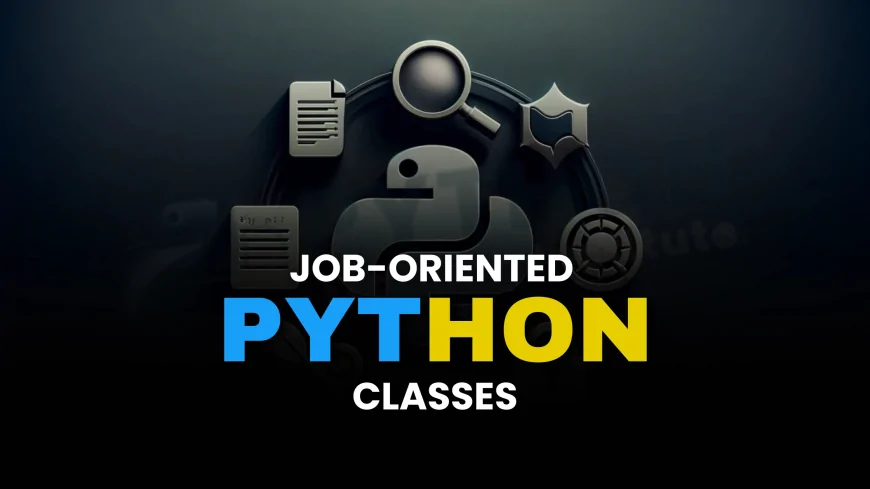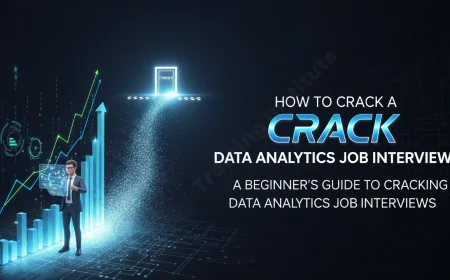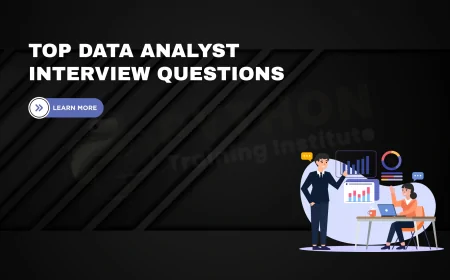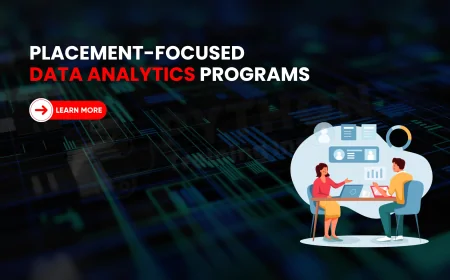Python Classes with Mock Interviews in Pune | Job-Oriented Python Coaching with Mock Interviews Pune
Join the best Python classes with mock interviews in Pune. Gain hands-on coding skills, real-world project experience, and crack interviews with expert-led mock sessions and placement support.

Introduction
In today’s competitive tech landscape, mastering Python is just the start — translating that knowledge into confidence during job interviews is what takes you over the finish line. Pune, with its vibrant IT ecosystem, offers several comprehensive Python courses that combine rigorous training with structured mock interview sessions. This article provides a detailed guide to such courses, what they offer, and how to assess them.
Why Learn Python?
Python is the most popular programming language globally, thanks to its readability, versatility, and robust ecosystem. From web development to data science, automation to AI, Python powers a wide range of domains. In Pune’s job market, Python is consistently among the top required skills in job descriptions — making it a wise investment for both fresh graduates and career changers.
Course Objectives
- Gain a solid foundation in Python syntax, data structures, and programming concepts.
- Build real-world projects to demonstrate practical skills.
- Develop problem-solving capability through algorithmic challenges.
- Practice mock interviews modeled after real IT company processes.
- Learn resume best practices, interview etiquette, and communication strategies.
Learning & Training Format
Most programs offer a hybrid of live classroom sessions, hands-on labs, and interactive coding sessions. Features include:
- Small batch sizes (10–20) for individual attention.
- Live coding labs—guided but also self-practice.
- Peer programming and group problem-solving.
- Recorded session library for revision.
- Ongoing doubt-resolution chat support.
Curriculum Breakdown
1. Python Fundamentals
Syntax, data types, operators, input/output, file handling, and basic debugging.
2. Control Flow & Collections
Loops, comprehensions, dictionaries, sets, tuples — usage and best practices.
3. Functions & Modules
Function definitions, arguments, return values, scope, namespaces, built-in and custom modules.
4. Object‑Oriented Programming
Classes, inheritance, encapsulation, polymorphism, special methods.
5. Exception Handling & Logging
Try-except blocks, custom exceptions, logging best practices.
6. Working with External Libraries
Standard libraries and pip ecosystem: NumPy, Pandas, Requests, BeautifulSoup, Matplotlib.
7. Algorithms & Data Structures
Lists, stacks, queues, trees, graphs, searching and sorting algorithms.
8. Web Development Essentials
Flask or Django introduction: routing, templating, ORM, REST APIs.
9. Database and File Operations
Relational databases (SQLite/MySQL), JSON, CSV, file systems.
10. Final Capstone Project
A fully functional application — e.g., blog, API service, data dashboard — integrating all concepts.
Sample Projects & Case Studies
- Todo App: CRUD operations, authentication, REST endpoints.
- E-commerce API: Product management, cart workflows, payment insights.
- Data Visualization Dashboard: Use of CSV/Excel data and Pandas/Matplotlib.
- Web Scraper: Gathering real-time data from websites and storing results.
- Chat Application: Real-time communication using WebSockets (advanced).
Each project is guided, yet encourages your own creativity to customize features, apply best practices, and prepare for real-world software environments.
Mock Interview Preparation
A highlight of these Pune-based courses: structured mock interviews, including:
- Technical Rounds: Live coding, DS/Algo questions, problem-solving under timer.
- System Design: Architecture planning, tradeoffs discussion (fundamentals only).
- HR / Behavioral: Common HR questions, personal pitch, communication clarity.
- Feedback & Coaching: Personalized session recordings, detailed feedback on logic, speed, attitude.
- Interview Simulations: Recruiter-style interviews with real professional feedback.
Continuous iteration through mock sessions helps build confidence and interview agility—crucial for mid-level roles.
Instructors & Mentors
These courses are taught by seasoned professionals — with 5+ years of industry experience in domains like:
- Product-based tech companies (e.g., SaaS, e-commerce)
- Analytics teams using Python (data pipelines, ML testing)
- Startups building scalable backends in Python
Mentorship continues even after course completion — with access to alumni networks and community forums.
Training Delivery & Tools
- IDE: VS Code setup with Python plugins.
- Collaboration: Git & GitHub/Bitbucket integration.
- Containerization: Basics of Docker for packaging apps.
- Deployment: Pushing projects to Heroku/AWS/IIS.
- Continuous Learning: Slack/Telegram support channels for learners.
- Assessment: Weekly quizzes and bi-weekly coding challenges.
Career & Placement Support
Comprehensive support includes:
- Resume building: Python-focused resume templates and feedback.
- Profile optimization: LinkedIn guidance, GitHub portfolio review.
- Interview prep: Frequently asked questions, problem areas, and coaching.
- Job referrals: Partnered companies in Pune hire through the training networks.
- Alumni webinars & panels: Q&A with placed alumni and recruiters.
Top Python + Mock Interview Training Institutes in Pune
- WebAsha Technologies – Full Python program with dedicated modules and coding bootcamp level intensity,Flexible scheduling, smaller batches, and placement assistance focused on mock prep.
Fees & Duration
Program durations range from 8 to 16 weeks depending on full-time or weekend batches. Fees typically range between ₹15,000 – ₹45,000, depending on:
- Content depth (algorithms vs. full-stack)
- Mock interview count and mentor involvement
- Placement assistance and referral tie-ups
Many institutes offer EMI options, early enrollment discounts, and demo/class trial sessions.
Student Success Stories
“After completing my Python course, the mock interviews gave me the confidence to crack the test coding round at TCS. I cleared the written test and got hired within three months.” — Akash P., Pune
“The mock interview coaches were extremely helpful. The feedback on my problem-solving approach helped me refine my mindset. I secured a job at a Pune-based fintech startup.” — Neha M.
“At first I was nervous, but after 5 mock sessions, I could solve DS/Algo questions smoothly. I placed with a 7 LPA package in an analytics firm.” — Sameer R.
How to Choose the Right Course
Before enrolling, evaluate based on the following criteria:
- Curriculum: Does it have a strong data structures & algorithms focus?
- Mock Interview Structure: Number and quality of rounds, feedback depth.
- Batch Size: Smaller sizes allow more personalized coaching.
- Mentor Credentials: Industry-experienced instructors are vital.
- Support & Alumni Network: Ongoing support indicates long-term value.
- Fee Transparency: All charges—materials, tools, placement—should be clear.
- Reviews & Outcomes: Verified reviews or referrals from placed alumni.
Frequently Asked Questions
1. Is prior programming experience required?
No. Courses start from basics and progress to advanced topics, with hands-on support along the way.
2. How many mock interviews are typically included?
Most comprehensive programs offer 5–10 mock interviews covering coding, system design, and HR stages.
3. What is the typical batch size?
Batch sizes usually range between 10–20 to facilitate personalized feedback.
4. Are the mock interviews conducted by experienced professionals?
Yes, mock interviews are often conducted by experienced developers or senior mentors.
5. Will I receive feedback on my interview performance?
Absolutely. Feedback is detailed—covering logic, code efficiency, communication, and behavioral aspects.
6. Can I attend demo classes before enrolling?
Yes, most institutes offer free demo sessions so you can evaluate teaching style and content.
7. Will I learn data structures and algorithms in depth?
Yes—strong focus on DS/Algo is a core part of mock interview prep and coding challenges.
8. Do I need to purchase any tools or software?
No—core IDEs and libraries are open-source. Optional tools like Docker or cloud platforms may be demonstrated.
9. Is the training instructor-led or self-paced?
Programs are predominantly instructor-led with scheduled live sessions and interactive components.
10. Can working professionals join evening or weekend batches?
Yes, many institutes offer evening and weekend batches tailored for working learners.
11. Do I get access to recorded lectures?
Yes, all sessions are recorded and accessible for catch-up and revision.
12. Are interview scripts and templates provided?
Yes—resume templates, cover letters, and common interview responses are often included.
13. Do institutes assist with resume and LinkedIn?
Yes, resume coaching and LinkedIn optimizations are commonly offered as part of career support.
14. Is placement guaranteed?
No, but many institutes offer strong placement assistance, referrals, or exclusive job listings.
15. How soon can I expect to land a job?
Placement can follow within 1–3 months of course completion, depending on individual effort and market conditions.
16. What types of jobs can I apply for?
Roles include Python Developer, Backend Engineer, Data Analyst, Automation Engineer, and QA roles.
17. Can I take additional mock interviews after completing the course?
Many institutes provide post-course mock sessions or alumni access for continued support.
18. Will I learn system design interviews?
Introductory system design concepts are included—especially for larger or scalable apps.
19. Are there any additional costs, such as for materials?
Course fees typically cover all materials. Occasionally, third-party certifications may cost extra.
20. How do I enroll in the course?
Visit the institute’s website to book a demo or fill out an enquiry form. After a short counseling call, you can register and pay the fee to begin.
Conclusion
A Python course in Pune that includes mock interviews offers more than just coding skills—it builds the confidence, problem-solving agility, and interview demeanor you need to succeed in today’s job market. By choosing a well-structured program with real-world projects, algorithmic depth, and strong placement support, you're setting yourself up to stand out in technical interviews and secure your ideal role.
What's Your Reaction?
 Like
0
Like
0
 Dislike
0
Dislike
0
 Love
0
Love
0
 Funny
0
Funny
0
 Angry
0
Angry
0
 Sad
0
Sad
0
 Wow
0
Wow
0















